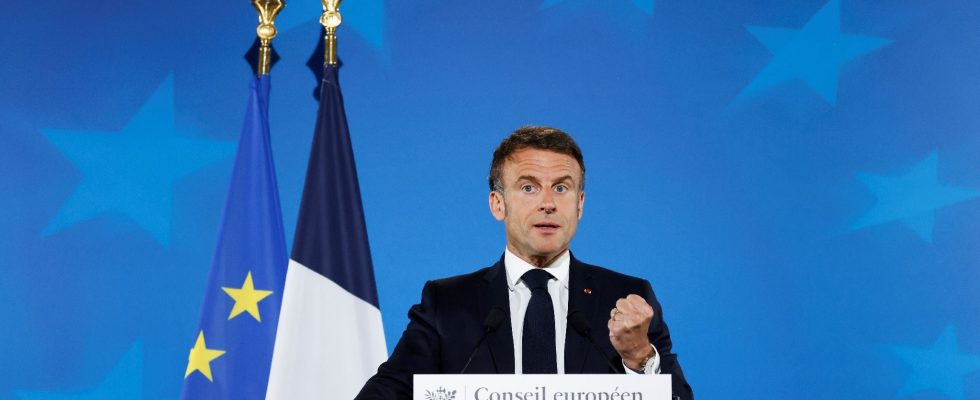This is not a campaign exercise. No, the Elysée rather depicts it as an “institutional moment”. That it would be ill-intentioned to qualify Emmanuel Macron’s major speech on Europe, expected this Thursday, April 25 at La Sorbonne, as an unofficial launch of an electoral campaign. Eight weeks before the European election on June 9? Only the disgruntled will dare to bring things together. The Head of State will deliver a speech at the Parisian university at 11 a.m., seven years after his ode to “European sovereignty” in the same place. He should highlight the successes recorded since 2017 – joint loan to finance the recovery plan, asylum and immigration pact, etc. – and praise the construction of a “powerful Europe”, a requirement born from the international tumult.
The executive defends non-partisan intervention, the opposition screams at the mixing of genres. Usual role play. Nicolas Sarkozy exposed himself to similar criticism in December 2011 after a speech in Toulon on the economic crisis at the dawn of the presidential campaign. Emmanuel Macron in turn benefits from the ambiguity of his status as president, both referee and pack leader.
In the presidential camp, the president’s intervention is impatiently awaited. The head of the Renaissance list, Valérie Hayer, is stuck at 18% of voting intentions, far behind the National Rally. The MEP, little known to the French, is struggling to bring back to the European level a campaign that Jordan Bardella intends to transform into a sanction vote against government policy. The Sorbonne speech comes like a breath of fresh air. The ideal opportunity to place Europe at the heart of the debate, and to awaken the Macronist electorate.
Mobilization ballot
The European elections are a “mobilization” vote. Abstention is strong, the winner is the one who brings together his base. And what better than Europe to push a Macronist to the polls? 96% of Valérie Hayer’s voters are “favorable to the European project”, according to an Ipsos survey for The world. 75% of them promise to take into account “party proposals on European issues” to make their choice. This Europhilia has no equivalent on the political scene. There is an urgent need to push this advantage forward. Internally, several voices are calling for a positive message around European construction to be added to the attacks against the far right. Thus, the Renaissance program should be revealed by May 7, the date of Valérie Hayer’s big Parisian meeting.
“The challenge is to limit the abstention of our voters. Our first target is the Macronists who doubt, confided Renew MEP Gilles Boyer in March. Emmanuel Macron obtained more than nine million votes in the first round of the presidential election, if we obtain 2/3 with 50% participation, that makes 25% of the votes.” The campaign adapts to this imperative. The towing and door-to-door operations take place near the polling stations most favorable to the head of state. Exit the large regional meetings, supplanted by a multiplication of more modest public meetings to get closer to the president’s supporters.
The presidential movement starts from afar. 52% of Emmanuel Macron voters in 2022 say they will vote, according to an Ifop survey published Tuesday. Valérie Hayer currently only has the support of 59% of them. At the same time, the frontist electorate of 2022 is more willing to leave their homes on Sunday June 9. “There is always the temptation to make this election a release,” fears a minister.
The wearing away of power
In 2019, Emmanuel Macron’s strong support for the list led by Nathalie Loiseau allowed the executive to limit the damage. The presidential camp hopes for a rewriting of history. May the figure of the Head of State bring his supporters tempted by abstention back into line. The president visited Valérie Hayer’s campaign headquarters on April 19, promising “to bring (his) forces to some key moments of the campaign.” “Even those of our voters who express bitterness or disagreements with the president do not question his European commitment,” judges Olivier Dussopt, deputy for Ardèche and number 2 of Renaissance.
Emmanuel Macron is no longer the young president of five years ago. The head of state is beginning the end of his reign, bogged down by the relative majority in the National Assembly. Weighted down, too, by unpopularity. “He is suffering from the erosion of power, it is structurally more difficult,” notes a campaign executive. “Sarkozy had succeeded in imposing a form of leadership even though he was at his lowest in the polls,” recalls a Renaissance MP. “But he did not have the same number of years under his belt.” Macron’s star has faded. Her camp prays she shines a little longer.
